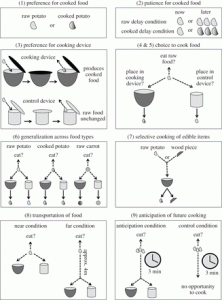The transition to a cooked diet represents an important shift in human ecology and evolution. Cooking requires a set of sophisticated cognitive abilities, including causal reasoning, self-control and anticipatory planning. Do humans uniquely possess the cognitive capacities needed to cook food? We address whether one of humans’ closest relatives, chimpanzees (Pan troglodytes), possess the domain-general cognitive skills needed to cook. Across nine studies, we show that chimpanzees: (i) prefer cooked foods; (ii) comprehend the transformation of raw food that occurs when cooking, and generalize this causal understanding to new contexts; (iii) will pay temporal costs to acquire cooked foods; (iv) are willing to actively give up possession of raw foods in order to transform them; and (v) can transport raw food as well as save their raw food in anticipation of future opportunities to cook. Together, our results indicate that several of the fundamental psychological abilities necessary to engage in cooking may have been shared with the last common ancestor of apes and humans, predating the control of fire.
http://rspb.royalsocietypublishing.org/content/282/1809/20150229


